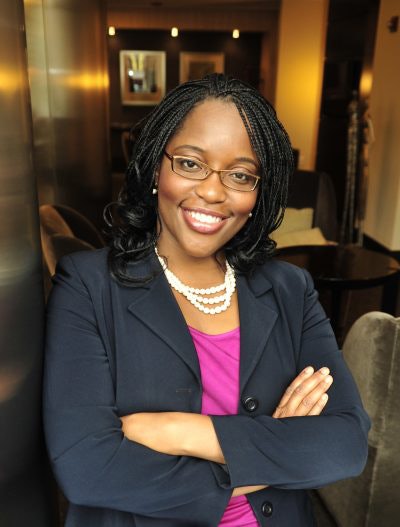Dr. Michelle Asha Cooper – who has served as president of the Institute for Higher Education Policy (IHEP) since 2008 – was appointed the deputy assistant secretary for higher education programs in the Office of Postsecondary Education at the U.S. Department of Education. As of this week, she’s listed on the department’s website as the acting assistant secretary for postsecondary education.
 Dr. Michelle Asha Cooper
Dr. Michelle Asha CooperHer colleagues are celebrating the selection and what they hope it signals: an equity-focused trajectory for higher education policy under President Joe Biden.
Cooper is “one of the nation’s most trusted voices in championing success for students in higher education regardless of race, socioeconomic background or gender,” said IHEP Interim President Mamie Voight. “Her passion for equity and social justice has shaped our work, inspired our team and built IHEP into the robust organization we are today. We are thrilled to see Dr. Cooper bring her equity-centered and student-ready mindset to her new role in the Biden-Harris administration and are eager to witness the transformative change she will bring to our nation’s postsecondary policies.”
Dr. Ted Mitchell, president of the American Council on Education, described Cooper as “wise, clear-headed and passionate about creating opportunity for traditionally underserved populations.” He credited her leadership for putting the Institute for Higher Education Policy “at the forefront of policy work aimed at eliminating racial disparities in educational outcomes.”
“Michelle Asha Cooper is a fabulous choice to serve as assistant secretary of whatever she wants, and most especially the Department of Education,” he wrote in a statement. “She will do a great job in the department and in working with the higher education community.”
Cooper comes to the position with years of higher education experience. In addition to her time at IHEP, she’s held leadership roles at the education department’s advisory committee on student financial assistance, the Association of American Colleges and Universities, the Council for Independent Colleges and King’s College.
In addition to her research, colleagues also praised Cooper’s ability to work across party lines.
“She’s non-stop,” said Dr. Stella Flores, who serves on IHEP’s board of directors. Flores is also the director of access and equity at the Steinhardt Institute for Higher Education Policy and dean for faculty development and diversity at New York University. “I’ve seen [Cooper] perform through very hospitable environments and very hostile environments toward equity. Her commitment to equity is unparalleled, but she’s also very knowledgeable of the policy calculus in different contexts.”
For example, Cooper pivoted her team at IHEP to focus on state-level higher education policy, and she “got on the ground” working with local legislators and community partners with a range of political views.
Across divides, “she’s just incredibly credible and trustworthy,” Flores said. “That’s what we need right now – credibility, an expert, a penchant for science and a human being people can depend on.”
As Cooper’s friend and as a recent addition to IHEP’s board, Dr. James L. Moore III expressed confidence that underrepresented students will be a priority for Cooper. He’s the vice provost for diversity and inclusion and chief diversity officer at The Ohio State University.
“In order for our country to reach the highest level of success, and in order for us to be able to engage democracy at a very high level, we must find ways in which our educational system can advantage everyone rather than disadvantage the few,” he said. “Our country can no longer watch people of color, women, not fair well in the education pipeline, particularly first-generation, low-income communities.”
He trusts Cooper to “move the agenda.” Under her leadership, IHEP was involved in research on Pell Grants for incarcerated students and student loan debt forgiveness, among other issues, he said. She’s not “just a policy wonk” but “intimately engaged” in the higher education sector.
From his perspective, “she’s the perfect fit, the perfect person for the position for the moment of time that we’re in.”
Sara Weissman can be reached at [email protected]



















